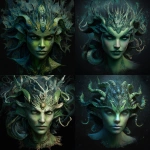Explore the Best AI Image Gallery

The AI Canvas: Transforming Marketing with Images Generated by Machines
Marketing has always relied heavily on compelling visuals to capture attention and convey messages. From eye-catching product photos to evocative advertisements, imagery plays a crucial role in shaping consumer perception and driving engagement. But the landscape of visual creation is undergoing a seismic shift with the advent of artificial intelligence (AI). AI-powered tools are now capable of generating stunning, original images from simple text prompts, ushering in a new era of possibilities for marketers.
The Creative Potential Unleashed
AI image generators offer a plethora of benefits for marketers seeking to elevate their visual content.
- Cost-Effectiveness: Traditional methods of creating marketing visuals often involve hiring professional photographers or designers, which can be expensive. AI tools provide a cost-effective alternative, enabling businesses to generate high-quality images at a fraction of the cost.
- Speed and Efficiency: AI image generation is remarkably fast. Marketers can generate multiple variations of an image within seconds, allowing for rapid prototyping and iteration. This agility is particularly valuable in fast-paced marketing environments where quick turnaround times are essential.
- Customization and Versatility: AI tools allow for a high degree of customization. Marketers can specify details such as style, composition, color palette, and even the mood they want to convey. This level of control enables the creation of truly unique and targeted visuals.
Applications in Marketing
The applications of AI-generated images in marketing are vast and continually expanding:
- Social Media Content: Create engaging, eye-catching visuals for social media platforms to capture attention and drive engagement.
- Product Visualization: Generate realistic renderings of products to showcase their features and benefits in online catalogs or marketing materials.
- Website Design: Enhance website aesthetics and user experience by incorporating AI-generated images into landing pages, blog posts, or product descriptions.
- Advertising Campaigns: Develop visually compelling advertisements that resonate with target audiences and stand out from the competition.
- Email Marketing: Personalize email campaigns with unique visuals that enhance the message and encourage opens and clicks.
Ethical Considerations
While AI image generation offers tremendous potential, it also raises ethical considerations that must be addressed:
- Copyright and Ownership: Questions arise regarding the ownership of AI-generated images. Who holds the copyright – the user who provides the prompt, the developer of the AI tool, or the AI itself?
- Bias and Representation: AI models are trained on massive datasets, which can reflect existing societal biases. It is crucial to ensure that AI-generated images do not perpetuate harmful stereotypes or discriminatory representations.
- Transparency and Disclosure: Marketers should be transparent about the use of AI-generated images and clearly disclose their origin to consumers.
Future Trends
The field of AI image generation is rapidly evolving, with continuous advancements pushing the boundaries of what is possible:
- Enhanced Realism: AI models will become increasingly sophisticated, generating images that are indistinguishable from real photographs.
- Multimodal Generation: AI will be able to generate images in conjunction with other media formats, such as text, audio, and video, creating immersive and interactive experiences.
- Personalization at Scale: AI will enable the creation of highly personalized visuals tailored to individual preferences and demographics.
As AI image generation technology continues to advance, marketers will have access to an ever-expanding toolkit for creating compelling and innovative visual content. By embracing these advancements responsibly and ethically, marketers can harness the power of AI to transform their creative strategies and connect with consumers in new and meaningful ways.
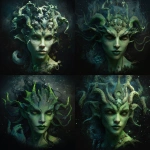
](https://images.ai-img.art/thumbnails/150/261d17404aa924fc9c65c324dfe07ad049150d0d5bf2d17602555726e3e4cbaf.webp)

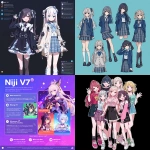



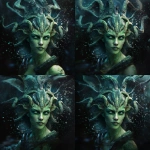
](https://images.ai-img.art/thumbnails/150/5db1b5c16845efa6b507cd5bd3beeebf64ee25f60cbec605c5db45589c05b3ec.webp)



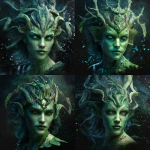









](https://images.ai-img.art/thumbnails/150/fb17f777267d8f5ab1321703cbbaeda3a578d164f369735fe07899d0a3c7f39c.webp)

](https://images.ai-img.art/thumbnails/150/ae1f022faddb1fa4e9990e3a6b422ca8ebc04a5f1023d5da1b491cf09f4c3a72.webp)

](https://images.ai-img.art/thumbnails/150/ffc604ea406b0a83a278328589577f8b7761d0063f4618ec6502794c116d21a2.webp)




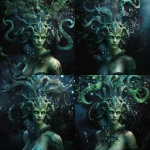









](https://images.ai-img.art/thumbnails/150/da63d2ce1bb9956da8f72ee5c1a22604a44aded9fd2883324716b0f11ac0cdfd.webp)
](https://images.ai-img.art/thumbnails/150/6e7c14b3d1c1d1294d6ce497cb648d3499121cebbeffbfced0daccaeeb7a4ffd.webp)
](https://images.ai-img.art/thumbnails/150/a7a08a01ca720b6946bdc5f019de05b39fd0cb008ff96117f5200907623bcdce.webp)



